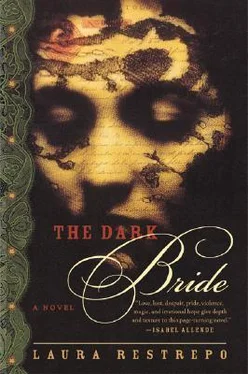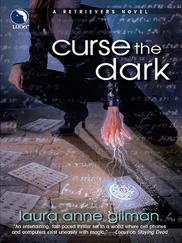“So what did that man do for you, apart from abandoning you, for you to be going to thank him?” Sacramento said to try to dissuade her.
“He gave me my being,” she answered, just like that; five dry, withering words that may not have meant much, but that didn’t offer any room for argument.
“He is going to leave Sasaima,” she said. “I have a feeling, if I don’t go now to look for him, I won’t find him.”
“All the more reason. I don’t know what your hurry is to go digging up sorrows.”
Nothing could be done. Sayonara was burning with an urgency that didn’t allow delays, an itch that made her stand up when she sat down; it woke her up if she lay down, tightened her throat and suffocated her appetite.
“She understood it as a mandate,” Olguita tells me, “or a mission she had to accomplish. She thought she should go to look for her father, as if her fate were demanding it.”
“Shoo, Felipe!” Todos los Santos drives away one of the Felipes, in this particular instance a quadruped with black fur, similar to a small pig, who is trying to eat her slipper.
“What did Amanda expect from her father?” I want to know.
“We all yearn for paternal approval,” responds Todos los Santos. “Even the worst sinners are afraid of living without it. Why? Because it’s human nature, and also her nature, Sayonara’s. She needed to know that her father didn’t condemn her for what she had done. If you ask me, I would say that was precisely why she stopped doing it.”
“What did Amanda expect from her father?” Sacramento echoes my question. “That’s exactly what her father wanted to know, as soon as he saw her.”
About to board a bus, because just at that moment he was hurrying to depart for Venezuela, don Abelardo Monteverde rubbed his eyes incredulously when he recognized his daughter Amanda — a ghost the past had vomited up without asking permission or giving warning — standing on a corner of the market plaza in Sasaima, her hair and the dark blue suit that she wore then, like a novice’s, soaking wet, and hidden behind her, also very wet and biting their nails with shyness and fear, were the three younger sisters, in organza and crinolines. Wiping from his forehead the copious sweat caused by such an unforeseen and embarrassing situation, don Abelardo didn’t ask what had happened to Ana, he didn’t know which was which, he didn’t inquire where they had come from, how they had survived in the intervening years, or even where they were going. Nor did he ask if they were hungry, or why their clothes were wet, and he never learned that they had traveled two days by bus, enduring stops and searches from first the army, then the guerrilleros, and then seven and a half hours by foot, along rugged paths and in the rain, to find him.
“You’ve found me at a bad moment, daughter,” he said to Amanda, addressing her because she was the eldest. “I don’t have any cash in my pocket and I’m about to leave on a trip. What do you need?”
“I only want your blessing, señor padre , for me and for my sisters.”
“That’s all?”
“ Sí, señor padre , that’s all.”
“Well, that being the case, there’s no problem,” said don Abelardo Monteverde, with his shirt open across a chest that was sparsely covered with hair and an enormous belly hanging over his tightly cinched waist, and he raised a fat right hand to bestow his blessing upon them.
“May God protect you,” he said four times, ceremoniously, touchingly, while being rushed by the bus driver who kept honking his horn to hurry the passengers because darkness was rapidly approaching.
Don Abelardo, his boot already resting on the bus’s running board, hesitated for a moment, holding back from his lips the hasta lueguito he had ready to end the surprise visit by these daughters, so remote now in his memory and his affections.
“Wait a second, I’ll pay you for the delay,” he said to the driver, and then he signaled for the girls to wait for him where they were standing. He crossed the market plaza in huge strides, took out a ring of keys, opened a door, and went into a house that must have been where he lived, or was perhaps his warehouse.
Several minutes later he returned with a porcelain elephant under his left arm and a length of cloth in his right hand.
“Take this, mija ,” he said to Amanda, handing her the elephant and the cloth and looking at her for an instant with a foolish expression that, forcing things a bit, could have been interpreted as tenderness. “Accept this from me, so you don’t go away empty-handed.”
Then he gave each one a kiss on the forehead: the clumsy and rough kiss of a man who never kisses. But a kiss nonetheless, the pathetic, shaky, and guilty gesture of someone who might have wished for things to be different and was seeking forgiveness.
“Forgive me, mija, ” he said to Amanda with a trembling voice, as if he were dangerously close to breaking into tears, “but I can’t do anything else for you all. I have a wife who would get angry, I have other children and a lot of obligations, I have another life now… you must understand… ”
“Don’t worry, señor padre . I want you to know that life, thank heaven, has treated us well and that we are leaving here grateful for these gifts, which are very pretty.”
Sayonara never again went looking for her father, perhaps because she had already obtained from him the blessing she thought was so necessary to move forward with her life. The elephant…
“I can understand that someone would want the Holy Pope’s blessing,” Fideo interrupts me as I am writing the previous paragraph, “but, what the hell good is a blessing from a man like Monteverde, so loutish and coarse?”
“You only have one father…,” I tell her.
“That’s a lie,” she replies. “You only have one mother; the father can be any old son of a bitch.”
Continuing: to move forward with her life. The elephant still exists, although its tusks are chipped. It sits on a corner cabinet in Olga’s house, and I am looking at it now. Meanwhile, Fideo is looking at me.
“Don’t think it’s one of a kind,” she says. “A lot of people around here like to decorate their houses with elephants just like that one. You also see a lot of clowns. And ballerinas. A lot of porcelain ballerinas. But nothing beats the elephant as decorative material.”
Fideo is right. Over the years, I have seen elephants like this one in the living rooms of many homes, and I wonder how it could happen that, among the infinite variety of objects with no precise use that exist throughout the whole country, there is one in particular that manages to stand above the others. It makes one think of a certain suspicious repetition, a certain persistence of a model that is imposed for some unknown reason, despite its gratuitousness. In other countries an example of these kinds of insistent objects, almost fetishes because of their ubiquitousness, might be plaster gnomes planted among the flowers in the garden. Here in Colombia, the elephant beats the gnome by a wide margin.
First, because it is seen in greater numbers, and second, because plaster gnomes come in different versions — with white beards, with black beards, with red caps, without caps, with a lantern in their hand, without a lantern — while the porcelain elephant is always the same in its gray sleekness, its soft breast like a matron’s, with a black, diminutive eye on each side of its face, the invariably chipped tusks, the partially open mouth revealing a pink, fleshy interior, the powerful foreleg bent and delicately balanced on a white ball of dubious interpretation, which could be a faded globe or a large balloon. Or maybe an elephant egg?
Читать дальше












